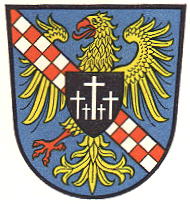Arnsburg: Difference between revisions
Knorrepoes (talk | contribs) m (Text replace - "[[Literature" to "{{media}} [[Literature") |
Knorrepoes (talk | contribs) m (Text replacement - "into:1" to "into: 1") |
||
| (36 intermediate revisions by the same user not shown) | |||
| Line 1: | Line 1: | ||
'''ARNSBURG''' | '''ARNSBURG''' | ||
State : [[Hessen]]<br/> | State:[[Hessen]]<br/> | ||
District (Kreis) : [[Giessen (kreis)|Giessen]]<br/> | District (Kreis):[[Giessen (kreis)|Giessen]]<br/> | ||
Incorporated into : 1977 [[Lich | Incorporated into: 1977 [[Lich]] | ||
= | [[File:arnsburg.jpg|center|alt=Wappen von {{PAGENAME}}/Arms (crest) of {{PAGENAME}}]] | ||
{| class="wikitable" | |||
|+Official blazon | |||
|- | |||
|'''German''' | |||
| In Blau mit schwarzem Herzschild, darin fünf silberne Kreuze in verschiednener Höhe, ein rot bewehrter goldener Adler, der mit einem von Rot und Silber geschachten Schrägbalken überdeckt ist. | |||
|- | |||
|'''English''' | |||
| blazon wanted | |||
|} | |||
===Origin/meaning=== | |||
The arms are a combination of the Roman eagle, the chequered fess of the Cistercian Ordre and the crosses of the German War-grave Authority. | The arms are a combination of the Roman eagle, the chequered fess of the Cistercian Ordre and the crosses of the German War-grave Authority. | ||
The Roman imperial eagle stands for the fact that one of the northernmost Roman fortresses was situated near Arnsburg and, at the same time, is a canting symbol. The local monastery was founded in 1174 by Kuno of Arnsburg-Münzenberg, and the building was completed in 1197. It was one of the wealthiest monasteries in the area, and of architectural importance. The crosses symbolise the fact that war graves were found in a part of the monastery. The colours, finally, are the colours of the counts of Solms, who became owners of the area in 1802. | The Roman imperial eagle stands for the fact that one of the northernmost Roman fortresses was situated near Arnsburg and, at the same time, is a canting symbol. The local monastery was founded in 1174 by Kuno of Arnsburg-Münzenberg, and the building was completed in 1197. It was one of the wealthiest monasteries in the area, and of architectural importance. The crosses symbolise the fact that war graves were found in a part of the monastery. The colours, finally, are the colours of the counts of Solms, who became owners of the area in 1802. | ||
[[Civic Heraldry Literature - Germany|'''Literature''']]: Stadler, 1964-1971, 8 volumes. | |||
{{de}} | |||
{{media}} | {{media}} | ||
[[Category:German Municipalities A]] | [[Category:German Municipalities A]] | ||
[[Category:Hessen]] | [[Category:Hessen]] | ||
[[Category:Giessen]] | [[Category:Giessen]] | ||
Latest revision as of 07:40, 13 August 2024
ARNSBURG
State:Hessen
District (Kreis):Giessen
Incorporated into: 1977 Lich
| German | In Blau mit schwarzem Herzschild, darin fünf silberne Kreuze in verschiednener Höhe, ein rot bewehrter goldener Adler, der mit einem von Rot und Silber geschachten Schrägbalken überdeckt ist. |
| English | blazon wanted |
Origin/meaning
The arms are a combination of the Roman eagle, the chequered fess of the Cistercian Ordre and the crosses of the German War-grave Authority. The Roman imperial eagle stands for the fact that one of the northernmost Roman fortresses was situated near Arnsburg and, at the same time, is a canting symbol. The local monastery was founded in 1174 by Kuno of Arnsburg-Münzenberg, and the building was completed in 1197. It was one of the wealthiest monasteries in the area, and of architectural importance. The crosses symbolise the fact that war graves were found in a part of the monastery. The colours, finally, are the colours of the counts of Solms, who became owners of the area in 1802.
Literature: Stadler, 1964-1971, 8 volumes.
This page is part of the German heraldry portal Deutsche Wappensammlung |
Heraldry of the World |
|
German heraldry:
|
Selected collector's items from Germany:
|
Contact and Support
Partners:
Your logo here ?
Contact us
© since 1995, Heraldry of the World, Ralf Hartemink 
Index of the site












